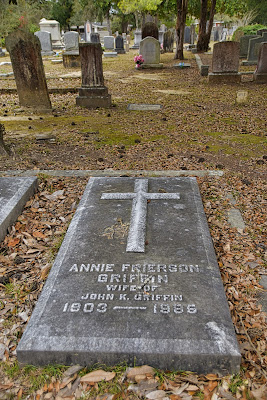During the latter part of the 19th and early part of the 20th centuries, various traveling shows criss crossed the United States combining entertainment and education in lectures, concerts, stories, and plays. Patterned after offerings of the Chatauqua Institute in western New York state, various groups sought to bring education and entertainment to small towns and villages. One of those entertainers, Anne Frierson, grew up in Kingstree.
Redpath Chatauqua advertisement for Anne Frierson.
University of Iowa Libraries
digital.lib.uIowa.edu/tc
Anne Frierson, who was known as Annie in her youth, described her upbringing like this. "I was born in the old town of Charleston, SC, in the conventional Charleston house of grey stone, with the porch running along the side and stained glass windows. My mother reared me, and my black "Dah." tended me. Sometimes my black "Dah" took me to see my "Grand-Dah" who lived "obuh de ribbuh." There I caught my first glimpse of native negro life, for in this Gullah settlement there were no white inhabitants."
In 1913, when Annie was 10, her father, Dr. Dickey Price Frierson, accepted a position as pharmacist at Scott's Drug Store in Kingstree. He would later buy the store. Annie's mother, Ivah Morgan Epps, was a Kingstree native, and the Friersons would build a home on a portion of the plantation owned by Ivah's parents, James W. and Martha Ann (Annie) Epps.
This house on Eastland Avenue is, I believe, where Annie Frierson grew up.
Anne Frierson noted that there were no white children living near their home and that she and her brother, Dolph, (whom many of us remember as the pharmacist at Frierson's Drug Store when we were young) soon discovered that their black playmates knew "far more fascinating games" than the few white children of their acquaintance. The mothers and grandmothers of those black playmates also had no qualms about handing out hunks of "tater" pie between meals or rewarding good children with peppermint candy. And, she mused, the black men knew all about ghosts and plat-eyes and what animals said to each other.
After graduation from Kingstree High School, Annie attended her mother's alma mater, Columbia College. (Ivah Frierson would become one of the first female trustees of that institution.) The inscription under the senior photo of Annie Isabelle Frierson in the 1924 Columbia College yearbook states: No telling what will become of Annie. she might land in the White House, or she might land in jail. But wherever she goes, she'll carry with her the heart of old Columbia College."
While at Columbia College, she had learned song-leading, and after graduation began her career as an entertainer by leading songs for Kiwanis, Rotary, and other civic organizations across the state of South Carolina. But after two years, she enrolled at Northwestern University in Illinois to pursue a Master's Degree.
At Northwestern, she studied speech, specializing in Gullah because so little was known about the Gullah people beyond the Sea Islands of South Carolina. She faced discrimination at Northwestern over her strong Southern accent. One professor tried to bar her from his class because of it. However, she told Greenville News reporter A.F. Gurlington for a 1934 article that she simply kept showing up for the class and eventually he had to accept her. She was a bit of a rebel, however, and refused to submit the thesis required for her to receive her degree. She would, instead, write a play. This same professor had told her that he believed her incapable of writing a play, and she was determined to prove otherwise. When she was finally given the go-ahead to submit a play instead of a thesis, she spent three days, working night and day with no sleep, to finish it.
The result, "Quagmire," a depiction of the life of the Gullah in South Carolina, was performed at both Northwestern's theatre and at the Playhouse Theatre in Chicago to rave reviews. Mayer Levine, the theatre critic for the Chicago Daily News, handed her the ultimate applause when he proclaimed it better than Porgy, referring to the DuBose Heyward novel, set in Charleston, that had recently been published, and would a few years later become the basis for the opera, Porgy and Bess.
The success of "Quagmire" led to requests for her to give recitations around Chicago, one of which caught the attention of a representative of the Redpath Chatauqua, who signed her to a three-year contract, making her the first member of her graduating class to secure a job. For the next three years she traveled from Maine to Florida and as far west as Colorado presenting stories and singing songs as she accompanied herself on the banjo.
Another photo of Anne Frierson from Redpath Chatuaqua materials.
In 1934, she married John K. Griffin in Kingstree United Methodist Church. Years later, their daughter would also choose Kingstree Methodist as the location for her wedding.
Anne Frierson Griffin taught at Wesleyan College in Lincoln, GA where she was head of the radio department. Later, she became a professor of speech and head of the drama department at Columbia College where she founded the CC Players. During her years teaching at Columbia College, she often expressed a desire to have all of her former students come back for a reunion dinner. In 1969, her students surprised her by hosting a dinner to which all of her former students were invited. One hundred fifty of them attended with a host of others making donations to what would become the Anne Frierson Griffin Scholarship Fund.
When she learned that they would be singing her favorite song, "The Daring Young Man on the Flying Trapese," she exhibited the exuberant spirit for which she was well-known by shouting, "Yippee."





1 comment:
What an inspiration Annie was and is to this humble Kingstree native.
~Henry Cole
Post a Comment